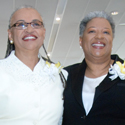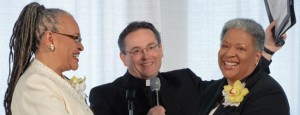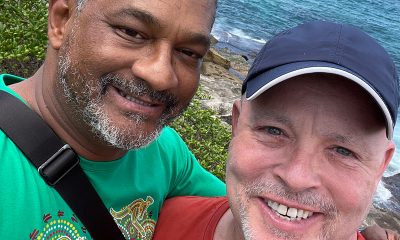Local
Looking back on the hoopla
Black couples took pride in being first to wed in D.C.


Revs. Darlene Garner and Candy Holmes were married at the Human Rights Campaign headquarters on March 9. (Photo by Joe Tresh)
On the eve of this weekend’s Black Pride festivities, the Blade checked in with two of the first same-sex couples who wed here in March to find out how they’re doing now that the hoopla has subsided, how they’ve fared as gay or lesbian couples among their black friends and families and their thoughts on the importance of Black Pride.
Three of the first couples to wed in Washington on March 9, the first day it was legally possible, were Angelisa Young and Sinjoyla Townsend, Reggie Stanley and Rocky Galloway and Revs. Darlene Garner and Candy Holmes. All three couples exchanged vows and rings at a carefully orchestrated event at Human Rights Campaign headquarters. All three couples are black.
“We were all asked to identify couples we knew locally who were planning to seize the opportunity immediately and we all put feelers out,” says Ellen Kahn, HRC’s family project director.
Garner said she thinks it was a coincidence that all three couples are black, but says it was still significant.
“Washington, D.C. is known by some as a chocolate city, so it was great that the first couples to be married were African-American couples,” she said.
Stanley and Galloway, a couple for six years, said no one would have noticed if all the couples had been white and that although they planned to wed regardless, controversial remarks made by Council member Marion Barry, who’s black and represents D.C.’s predominantly black Ward 8, inspired them to get married as soon as the law would allow. Barry, who’d previously been supportive of gay rights, said last year after voting against a bill to recognize same-sex marriages performed elsewhere in D.C., that his Ward “don’t have but a handful of openly gay residents” and that the majority of his constituents are opposed to same-sex marriage.
“He was basically saying that black gay folks don’t exist in his ward so we thought it was important to be visible and present,” Stanley said. Though he and Galloway live in Ward 4, they said they felt it important to show Barry there are many black gay D.C. residents.
Garner and Holmes, who had dated off and on for 14 years, said they decided to wed immediately for several reasons, some practical, others symbolic. As ordained ministers in the Fellowship of Metropolitan Community Churches, a liberal, mostly gay Christian denomination, they felt it was important to make a public stand.
“We recognized in many ways our place as role models as both representative of the black community and the LGBT community locally,” Garner said. “So we were happy to take our stand as a legally married couple standing side by side through the struggles.”
Garner works full-time in ministry but Holmes ministers part-time while also holding a full-time government job. She said that was also a factor in their decision to wed at HRC.
“None of it was lost on us,” Holmes said. “Being a couple and being African American and being lesbian, and with me being a federal government worker and also clergy, that’s a lot and so there are a lot of voices and things we represent, so it’s something we took very seriously and I think that’s significant.”
Stanley knew some HRC leaders through his own LGBT activism work.
“HRC was very forward looking and they were really interested in showing all aspects of what marriage can look like both here and across the country,” he said. “They realized there would be national coverage so I think they realized it was important for this visual to be seen.”
Garner and Holmes initially planned to make themselves available on HRC’s behalf to help field press inquiries and counter the anti-gay marriage stances several local black clergy, such as Bishop Harry Jackson of Hope Christian Church, had taken.
“We were initially going to fly away somewhere and get married,” Garner said. “But when it became clear that we could get married here, they asked if we’d like to do it with them. It became kind of a collaboration.”
Was there any concern their special day would become a circus? Both couples said HRC handled the day so well, it didn’t feel that way.
“There really was no media barrage at all,” Galloway said.
The women agree.
“We were able to experience the typical giddiness of any engaged couple looking forward to their wedding,” Garner said. “HRC did a phenomenal job and our primary focus stayed on the fact that we were getting married. We did not take into consideration at all that the world might be watching.”
Garner and Holmes plan a religious ceremony during their denomination’s annual conference in Acapulco in June.
The couples met standing in line that morning to get their licenses. They had their ceremonies at HRC in the order they got their licenses.
“We all cried and applauded and supported one another,” Holmes said. “Then when one came back, the next couple marched in so we were all there together, then we had a joint reception.”
“It was lovely,” Garner said. “HRC converted one of their big meeting rooms into a wedding chapel and we were able to create the ceremony we wanted to have from processional to recessional, with music and presiders and everything just as we wanted.”
The couples — Young and Townsend did not respond to interview requests — said life has returned to normal after the barrage of media attention.
“Things are great,” Galloway said. “Just like with any wedding, there’s a lot of activity leading up to it, but we’re back to a normal life now.”
Both couples said they encountered zero negative feedback but were greeted with many cheers, applause and congratulations, both on the day itself and after.
“People have recognized me and stop me in the hall to congratulate me,” Holmes said. “It’s been wonderful.”
And both couples say Black Pride remains important. Some of the reasons why, they said, popped up during the marriage wars, with the Barry incident and elsewhere.
“We were more active with it in our single days than in later years,” Galloway said. “But it’s still important to show diversity among the gay community. It’s a wonderful weekend and continues to be a very important event.”
Garner and Holmes will be out of town this weekend but said they fully support Black Pride. Garner, one of the founders of the National Coalition of Black Lesbians and Gays, said misperceptions about black gays persist.
“There’s still this perception that all gay people are white and that all black people are straight and many people really cling to that myth,” she said. “So it’s especially important for black LGBT people to come out, be visible and speak out so we continue to break down the barriers that other people have constructed to keep us all segregated from each other.”
Maryland
Rockville teen charged with plotting school shooting after FBI finds ‘manifesto’
Alex Ye charged with threats of mass violence

BY BRETT BARROUQUERE | A Montgomery County high school student is charged with what police describe as plans to commit a school shooting.
Andrea Ye, 18, of Rockville, whose preferred name is Alex Ye, is charged with threats of mass violence. Montgomery County Police and the FBI arrested Ye Wednesday.
The rest of this article can be found on the Baltimore Banner’s website.
District of Columbia
New D.C. LGBTQ+ bar Crush set to open April 19
An ‘all-inclusive entertainment haven,’ with dance floor, roof deck

D.C.’s newest LGBTQ+ bar called Crush is scheduled to open for business at 4 p.m. on Friday, April 19, in a spacious, two-story building with a dance floor and roof deck at 2007 14th St., N.W. in one of the city’s bustling nightlife areas.
A statement released by co-owners Stephen Rutgers and Mark Rutstein earlier this year says the new bar will provide an atmosphere that blends “nostalgia with contemporary nightlife” in a building that was home to a popular music store and radio supply shop.
Rutgers said the opening comes one day after Crush received final approval of its liquor license that was transferred from the Owl Room, a bar that operated in the same building before closing Dec. 31 of last year. The official opening also comes three days after Crush hosted a pre-opening reception for family, friends, and community members on Tuesday, April 16.
Among those attending, Rutgers said, were officials with several prominent local LGBTQ organizations, including officials with the DC Center for the LGBTQ Community, which is located across the street from Crush in the city’s Reeves Center municipal building. Also attending were Japer Bowles, director of the Mayor’s Office of LGBTQ Affairs, and Salah Czapary, director of the Mayor’s Office of Nightlife and Culture.
Rutgers said Crush plans to hold a grand opening event in a few weeks after he, Rutstein and the bar’s employees become settled into their newly opened operations.
“Step into a venue where inclusivity isn’t just a promise but a vibrant reality,” a statement posted on the Crush website says. “Imagine an all-inclusive entertainment haven where diversity isn’t just celebrated, it’s embraced as the very heartbeat of our venue,” the statement says. “Welcome to a place where love knows no bounds, and the only color or preference that matters is the vibrant tapestry of humanity itself. Welcome to Crush.”
The website says Crush will be open Tuesdays and Wednesdays from 4 p.m. to 12 a.m., Thursdays from 4 p.m. to 2 a.m., Fridays from 4 p.m. to 3 a.m., Saturdays from 2 p.m. to 3 a.m., and Sundays from 2 p.m. to 12 a.m. It will be closed on Mondays.
Crush is located less than two blocks from the U Street Metro station.
District of Columbia
Reenactment of first gay rights picket at White House draws interest of tourists
LGBTQ activists carry signs from historic 1965 protest

About 30 LGBTQ activists formed a circular picket line in front of the White House Wednesday afternoon, April 17, carrying signs calling for an end to discrimination against “homosexuals” in a reenactment of the first gay rights protest at the White House that took place 59 years earlier on April 17, 1965.
Crowds of tourists looked on with interest as the activists walked back and forth in silence in front of the White House fence on Pennsylvania Avenue. Like the 1965 event, several of the men were dressed in suits and ties and the women in dresses in keeping with a 1960s era dress code policy for protests of the Mattachine Society of Washington, D.C., the city’s first gay rights group that organized the 1965 event.
Wednesday’s reenactment was organized by D.C.’s Rainbow History Project, which made it clear that the event was not intended as a protest against President Joe Biden and his administration, which the group praised as a strong supporter of LGBTQ rights.
“I think this was an amazing event,” said Vincent Slatt, the Rainbow History Project official who led efforts to put on the event. “We had twice as many that we had hoped for that came today,” he said.
“It was so great to see a reenactment and so great to see how far we’ve come,” Slatt said. “And also, the acknowledgement of what else we still need to do.”
Slatt said participants in the event who were not carrying picket signs handed out literature explaining the purpose of the event.
A flier handed out by participants noted that among the demands of the protesters at the 1965 event were to end the ban on homosexuals from working in the federal government, an end to the ban on gays serving in the military, an end to the denial of security clearances for gays, and an end of the government’s refusal to meet with the LGBTQ community.
“The other thing that I think is really, really moving is some of the gay staff inside the White House found out this was happening and came out to greet us,” Slatt said. He noted that this highlighted how much has changed since 1965, when then President Lyndon Johnson’s White House refused to respond to a letter sent to Johnson from the Mattachine Society explaining its grievances.
“So now to have gay people in the White House coming out to give us their respects and to say hello was especially meaningful to us,” Slatt said. “That was not expected today.”
Among those walking the picket line was longtime D.C. LGBTQ rights advocate Paul Kuntzler, who is the only known surviving person who was among the White House picketers at the April 1965 event. Kuntzler said he proudly carried a newly printed version of the sign at Wednesday’s reenactment event that he carried during the 1965 protest. It stated, “Fifteen Million Homosexuals Protest Federal Treatment.”
Also participating in the event was Japer Bowles, director of D.C. Mayor Muriel Bowser’s Office of LGBTQ Affairs. Bowles presented Slatt with a proclamation issued by Bowser declaring April 17, 2024, Mattachine Society Day in Washington, D.C.
“Whereas, on April 17, 1965, the Mattachine Society of Washington courageously held the nation’s inaugural picket for gay rights, a seminal moment in the ongoing struggle for LGBTQIA+ equality in the United States, marking the genesis of public demonstrations advocating for those rights and paving the way for Pride Marches and Pride celebrations worldwide,” the proclamation states.
About 30 minutes after the reenactment event began, uniformed Secret Service agents informed Slatt that due to a security issue the picketers would have to move off the sidewalk in front of the White House and resume the picketing across the street on the sidewalk in front of Lafayette Park. When asked by the Washington Blade what the security issue was about, one of the Secret Service officers said he did not have any further details other than that his superiors informed him that the White House sidewalk would have to be temporarily cleared of all people.
Participants in the event quickly resumed their picket line on the sidewalk in front of Lafayette Park for another 30 minutes or so in keeping with the 1965 picketing event, which lasted for one hour, from 4:20 p.m. to 5:20 p.m., according to Rainbow History Project’s research into the 1965 event.
Although the LGBTQ picketers continued their procession in silence, a separate protest in Lafayette Park a short distance from the LGBTQ picketers included speakers shouting through amplified speakers. The protest was against the government of Saudi Arabia and organized by a Muslim group called Al Baqee Organization.
A statement released by the Rainbow History Project says the reenactment event, among other things, was a tribute to D.C.-area lesbian rights advocate Lilli Vincenz, who participated in the 1965 White House picketing, and D.C. gay rights pioneer Frank Kameny, who founded the Mattachine Society of Washington in the early 1960s and was the lead organizer of the 1965 White House protest. Kameny died in 2011 and Vincenz died in 2023.
The picket signs carried by participants in the reenactment event, which were reproduced from the 1965 event, had these messages:
• “DISCRIMINATION Against Homosexuals is as immoral as Discrimination Against Negroes and Jews;”
• “Government Should Combat Prejudice NOT PROMOTE IT”
• “White House Refuses Replies to Our Letters, AFRAID OF US?
• “HOMOSEXUALS Died for their Country, Too”
• “First Class Citizenship for HOMOSEXUALS”
• “Sexual Preference is Irrelevant to Employment”
• “Fifteen Million U.S. Homosexuals Protest Federal Treatment”
-

 Africa4 days ago
Africa4 days agoCongolese lawmaker introduces anti-homosexuality bill
-

 District of Columbia1 day ago
District of Columbia1 day agoReenactment of first gay rights picket at White House draws interest of tourists
-

 World4 days ago
World4 days agoOut in the World: LGBTQ news from Europe and Asia
-

 Arizona1 day ago
Arizona1 day agoAriz. governor vetoes anti-transgender, Ten Commandments bill








